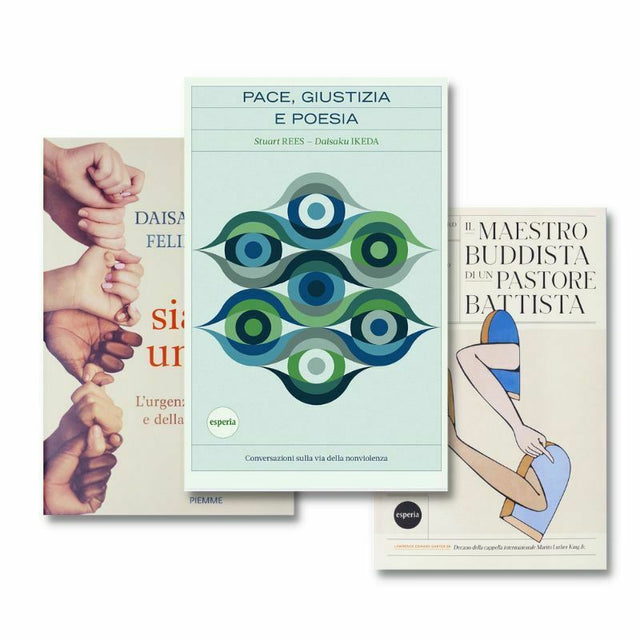
I dialoghi di Ikeda
-
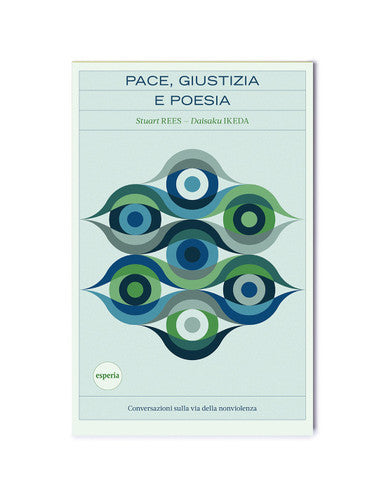
Esperia Pace, giustizia e poesia
La pace non è solo assenza di guerra. Spesso vengono lanciati appelli per gli ideali di “pace e giustizia” ma la maggior parte delle volte finiscono per diventare dei semplici slogan. Nel dialogo contenuto in questo libro, Stuart Rees e Daisaku Ikeda condividono le loro idee e visioni su come creare le condizioni per la pace attraverso una profonda presa di coscienza, un impegno per la nonviolenza in quanto “legge di vita” e una dedizione incrollabile. È convinzione degli autori che siano infatti questi elementi concreti, e non un’ideologia o un pensiero astratto, a rendere possibile una società che coltivi la dignità di tutte le persone. Infine, Rees e Ikeda sottolineano come lo “spirito poetico” sia uno strumento creativo d’eccellenza per immaginare e realizzare un futuro in cui pace e giustizia siano una cosa sola. Pace, giustizia e poesia offre un’analisi affascinante e convincente dei mali che affliggono la nostra società. Indica inoltre un percorso nonviolento che conduce a una pace autentica e offre a chi ricerca la pace l’incoraggiamento e l’ispirazione di cui ha bisogno. Joseph Camilleri, professore emerito di Relazioni Internazionali, La Trobe University, Melbourne
€15,90
-

Esperia Storie di vita, jazz e buddismo
Il maestro spirituale si confronta con due discepoli che hanno raggiunto i vertici della notorietà nell’ambito del Jazz contemporaneo. Il desiderio di trasmettere lo spirito creativo e l’importanza della crescita interiore dell’artista, così come di ogni altra persona, sono alcuni dei temi intorno a cui si articola il dialogo. I tre autori descrivono diverse esperienze rilevanti della loro vita e ci aiutano a capire quanto sia importante il continuo processo di rinnovamento che accomuna la ricerca religiosa e la creatività di un artista.
€14,00
-
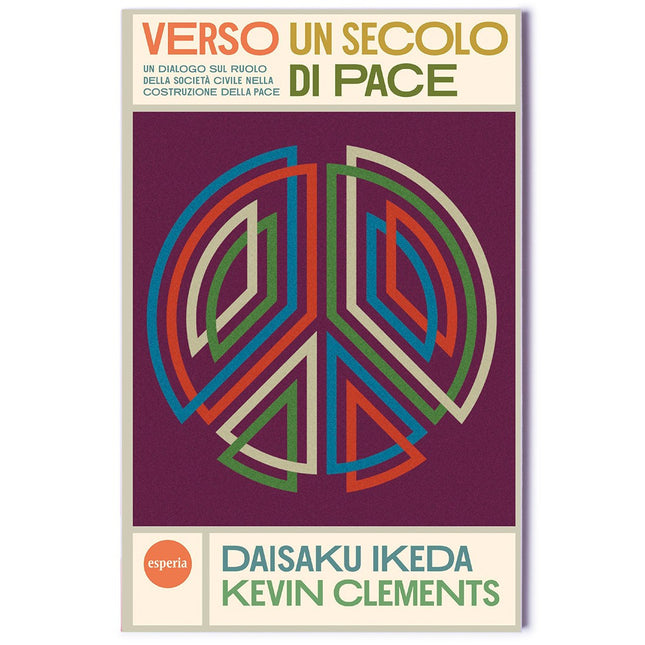
Esperia Verso un secolo di pace
Un dialogo sul ruolo della società civile nella costruzione della pace. In questo libro Kevin P. Clements, uno dei maggiori esperti mondiali di studi sulla risoluzione dei conflitti, dialoga con il filosofo e leader buddista Daisaku Ikeda sul tema della pace e sul ruolo della società civile in questo ambito. Nelle loro conversazioni, tutt’altro che accademiche o teoriche, basate sulle esperienze concrete dei due autori, che hanno dedicato la vita alla costruzione della pace, essi forniscono una grande quantità di esempi in cui è stata l’azione delle persone comuni a trasformare situazioni sociali e politiche. Emergono aspetti inconsueti del processo di costruzione della pace, che non sono alla portata solo dei diplomatici e degli statisti ma di ogni persona. Ad esempio, l’importanza di “immaginare” come sarebbe il mondo in cui vorremmo vivere, o l’importanza della “convivialità”, cioè il piacere di dialogare con le persone in circostanze informali, come davanti a un bel pranzo, che sorprendentemente si è rivelata cruciale per tanti negoziati. È un invito rivolto a tutti e in particolare ai giovani a prendere coscienza del proprio potere, perché, come afferma Daisaku Ikeda, «la mancanza di fiducia verso il governo si osserva in ogni paese, ma se i giovani perdono interesse nella politica, la società non avrà un futuro». E sempre ai giovani, ma non solo, è rivolto l’appello dei due autori a correre il rischio di uscire dalla propria zona di sicurezza per aprirsi alla diversità degli altri. La convinzione di questi due grandi pensatori è che la strada per la pace si aprirà solo quando i giovani lavoreranno insieme per uno scopo comune, uniti per risolvere i problemi al di là dei confini nazionali. «La pace non è qualcosa di astratto o separato dalla vita quotidiana. Tutti possiamo fare qualcosa per la pace proprio lì dove ci troviamo adesso.» Daisaku Ikeda «La paura e la sfiducia non aiutano il cambiamento. L’unica strada per creare un mondo giusto e pacifico è agire con la fiducia di volere un futuro migliore.»Kevin Clements «Ascoltare sinceramente i problemi di una singola persona, lì dove ci troviamo adesso, incoraggiarla e alimentare la speranza nel suo cuore è uno sforzo umile e tenace; forse non sarà una notizia che farà il giro del mondo, forse non entrerà negli annali della storia, ma ogni persona che sentirà ardere nel suo cuore una speranza nuova ritroverà la forza di vivere, e la vostra azione sarà stata preziosa per la sua vita. Questa è la base di un solido movimento per la pace ben radicato nel cuore delle persone. È mio fervido desiderio che i giovani per primi continuino a costruire una rete di persone che diffondono gioia e rivitalizzazione, creando così un magnifico raggio di luce per il ventunesimo secolo.»Daisaku Ikeda
€15,90
-
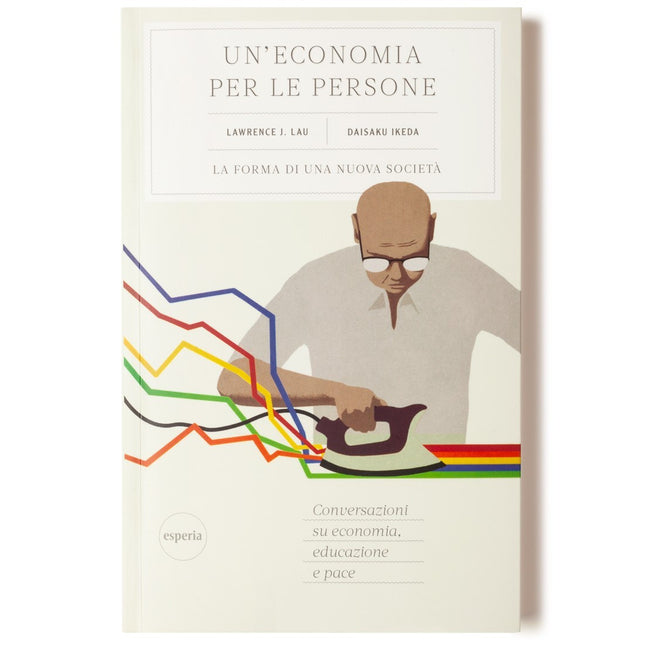
Esperia Un'economia per le persone
È indiscutibile che l'economia abbia un ruolo fondamentale nella nostra vita, sia a livello individuale sia a livello sociale. Eppure, molti trovano l'argomento complesso e difficile da affrontare e tendono a non occuparsene. In questo dialogo l'economista Lawrence J. Lau e il filosofo buddista e presidente della Soka Gakkai Internazionale Daisaku Ikeda affrontano il tema dello sviluppo dell'economia nella società moderna da una prospettiva storica, esaminando quali lezioni si possono trarre dalle crisi valutarie dell'Asia orientale nel 1997 e dalla crisi finanziaria globale nel periodo 2007-2009. Toccando vari argomenti, gli autori aiutano i lettori a comprendere le sfide che la globalizzazione ha imposto alle economie, l'importanza della regolamentazione dei governi sui mercati e la delicata questione del coniugare la crescita economica di un paese con il benessere della popolazione nel suo complesso. Queste conversazioni, in cui gli aspetti economici non vengono separati dalla vita quotidiana delle persone, diventano così piccole lezioni di economia, in cui, grazie a un linguaggio semplice e alla portata di tutti, si può iniziare a svelare il mistero dell’economia, disciplina che riguarda l’ossatura del mondo in cui siamo immersi, la cui conoscenza spesso ci viene preclusa dalle complessità tecnica e dalla terminologia specialistica. «L’economia» diceva l’economista John Kenneth Galbraith «deve servire per la felicità umana» e «la forza fondamentale che muove l’economia sono le persone». Daisaku Ikeda è presidente della Soka Gakkai Internazionale (SGI) e leader del movimento buddista che si richiama all'insegnamento di Nichiren Daishonin. Attivista, filosofo, educatore e poeta, da oltre settant'anni Ikeda si dedica a diffondere l'umanesimo buddista in tutto il mondo e a costruire le fondamenta per una cultura di pace. La SGI, che conta membri in 192 paesi e territori, incoraggia i singoli individui a sviluppare il potenziale interiore e a dare il loro contributo come cittadini globali per superare le sfide collettive che il genere umano deve affrontare. È fondatore dell’Università Soka, che conta sedi in Giappone e negli Stati Uniti, e di molte altre istituzioni che si impegnano nella ricerca di soluzioni alle molte crisi dell’epoca contemporanea. Nel 1983 è stato insignito del premio delle Nazioni Unite per la Pace. Lawrence J. Lau è stato Professore di Economia all'Università Stanford dal 1976 al 2004, per poi diventare il sesto Vice Cancelliere dell'Università cinese di Hong Kong, ricoprendo quella posizione per sette anni. È autore di numerose pubblicazioni tra cui The Chinese Economy in the Twenty-first Century: An Econometric Approach. La sfida della politica sta nel bilanciare la crescita economica con il miglioramento della qualità della vita delle persone e la garanzia che questo sforzo sia stabile e sostenibile. Il secondo presidente della Soka Gakkai Josei Toda spesso ci ha detto che la felicità individuale non dovrebbe mai essere sacrificata sull'altare della prosperità sociale ma che i due aspetti devono avanzare di pari passo. Credo che vi sia una crescente urgenza affinché l'attività economica non si concentri esclusivamente sull'efficienza ma anche sull'interesse della collettività. Daisaku Ikeda Per superare la crisi attuale le economie sviluppate devono concentrarsi sul far ripartire l’economia reale, percorrendo un cammino di crescita sostenibile e non inventando ulteriori giochi di prestigio finanziari. Non dobbiamo perdere di vista che il ruolo del settore finanziario è quello di sostenere gli altri settori dell’economia e che in ultima analisi il settore finanziario si deve basare direttamente sulla performance dell’economia reale. Lawrence J. Lau
€15,90
-
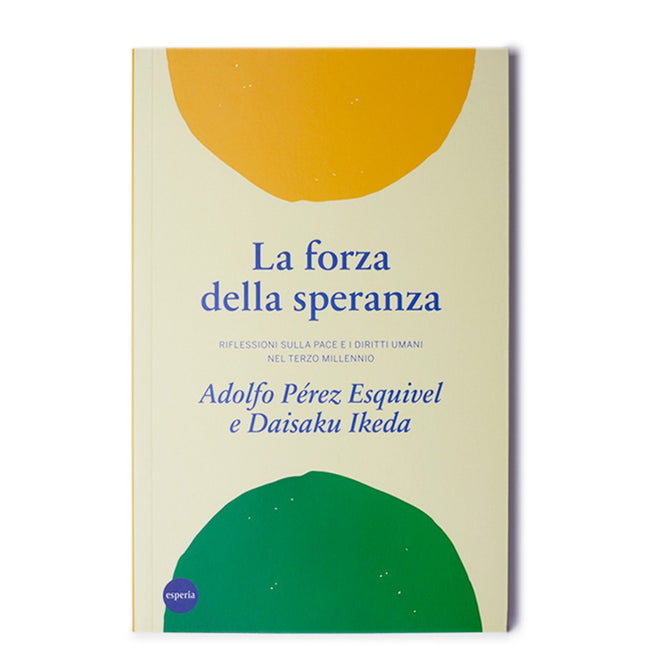
Esperia La forza della speranza
Una grande distanza geografica e culturale separa il Giappone dall’Argentina. Tuttavia, Daisaku Ikeda, presidente della Soka Gakkai Internazionale, e Adolfo Pérez Esquivel, premio Nobel per la Pace, sono riusciti a costruire un’amicizia profonda, basata su affinità e valori comuni, in difesa dei diritti umani senza frontiere né discriminazione alcuna. Ikeda e Pérez Esquivel intavolano un dialogo su temi quali la solidarietà, la saggezza dei popoli e delle donne, la resistenza ai totalitarismi, la ricerca di un’azione efficace e la valorizzazione delle diverse culture, con lo scopo di trovare una via per la pace. Gli autori, per mezzo della parola e degli esempi di vita, cercano di trasmettere ai giovani il valore dell’impegno energico e appassionato per la pace, la speranza e la giustizia per i loro popoli e per tutti i popoli della Terra.
€13,00
-
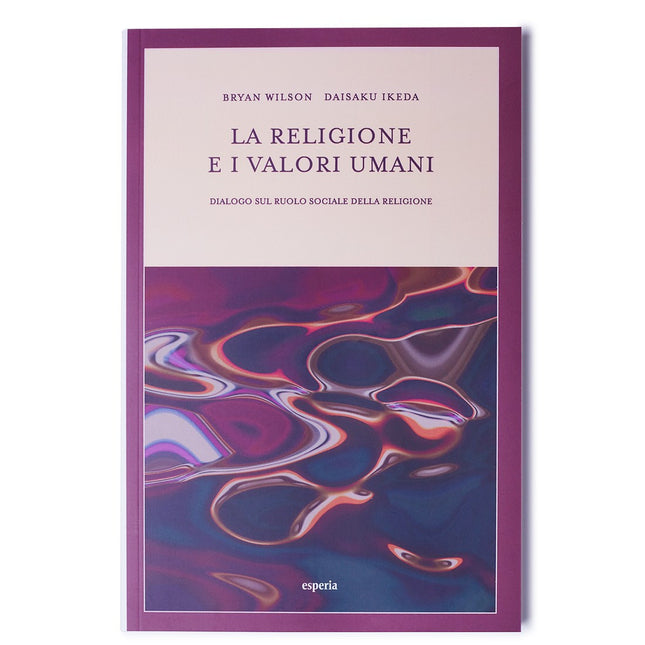
Esperia La religione e i valori umani
Un leader buddista giapponese, Daisaku Ikeda, e un sociologo britannico, Brian Wilson, discutono del ruolo della religione e delle sue connessioni con i principali problemi etici e sociali del nostro tempo. il loro dialogo mette a fuoco il ruolo e l'importanza della religione e del sentimento religioso tanto per l'individuo quanto per la società nel suo complesso. Emergono le potenzialità positive delle dottrine religiose per lo sviluppo interiore degli esseri umani e il buon funzionamento della società. Gli autori tuttavia non mancano di sottolineare i rischi legati all'istituzionalizzazione dei movimenti religiosi e all'utilizzo della religione come strumento di controllo e di potere.
€15,90
-
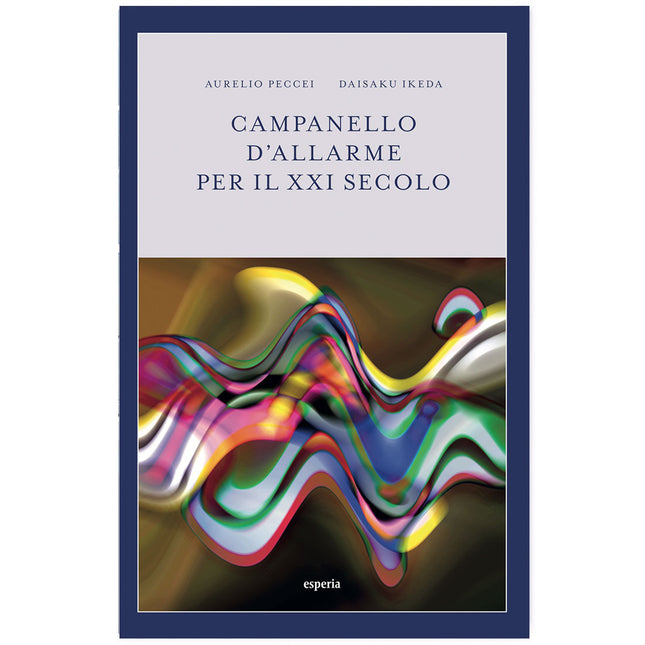
Esperia Campanello d'allarme per il XXI° secolo
Ricostruire un rapporto sano e armonico con la Natura, affrontare la questione dell’incremento demografico, fare i conti con i problemi legati alle risorse energetiche, mettere fine ai conflitti che distruggono interi popoli ed ecosistemi. Sono argomenti che nel corso degli ultimi trent’anni sono stati affrontati a più riprese sotto molti punti di vista e che hanno in Aurelio Peccei un vero e proprio precursore. Fondatore del Club di Roma e promotore del celebre rapporto intitolato I limiti dello sviluppo, egli affrontò insieme al presidente della SGI Daisaku Ikeda molti temi che ancora oggi si impongono, persino con maggiore urgenza, alla nostra attenzione. Il compito che i due autori si assunsero era gravoso, soprattutto per l’evidente difficoltà di “cantare fuori dal coro”, ovvero cercare di stimolare un grande dibattito internazionale su argomenti che pochi erano disposti a mettere in discussione. Ma è proprio in questo che si riconosce la caratura dei grandi protagonisti, che si fanno portatori di messaggi che valicano il momento presente e ci spingono a costruire una chiara visione del futuro.
€16,00








